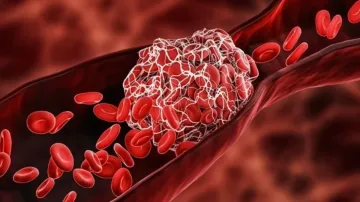Thrombosis is a disease that affects millions of people around the world, but most people are still unaware of it. Nonetheless, due to the number of cases reported and the possible damages it may cause, we have to speak about it and learn about it: the silent killer.
What Is Thrombosis?
Medical terms describe thrombosis as a process in which there is blood clot formation within a blood vessel. These clots may arise within the arterial or venous system, and they may be fatal. When there is clot formation of blood, it will block blood flow in its usual passage affecting seriously a patient with an attack that might be a heart attack, stroke, or pulmonary embolism.
Causes of Thrombosis
There are several risk factors which increase the chances of thrombosis. They include sedentary lifestyle, obesity, smoking, pregnancy, genetics and age.
Thrombosis Symptoms
- Swelling in the affected region, that is, in either your leg or arm.
- The affected area presents redness or discolouration of the skin.
- Pain or tenderness in the affected area.
- The area feels warm.
- In the case of pulmonary embolism, you may experience shortness of breath and chest pain.
Types of Thrombosis
Arterial Thrombosis: This is a condition of thrombosis where a blood clot forms in an artery. An artery carries oxygen and blood from the heart towards other parts of the body. It may lead to serious conditions such as stroke or heart attack.
Venous Thrombosis: Venous thrombosis is formed when there is a blood clot in the vein. The role of the vein is to carry oxygen-depleted blood back to the heart. It causes deep vein thrombosis (DVT) or pulmonary embolism (PE).
Treatment for Thrombosis
- Anticoagulants: These drugs will prevent the formation of further clots and allow your body to dissolve the clots that have already formed.
- Thrombolytics: In some cases, drugs are administered to treat clots that have already formed.
- Surgery: In severe cases, the clot may be removed or a narrowed blood vessel opened up by surgical intervention.
Prevention of Thrombosis
Exercise: Regular exercises improve the blood flow and prevent blood clots from emerging in the veins.
Quitting Smoking: Quitting smoking may improve the health of your blood vessels, which ensures a lower probability of thrombosis in healthier blood vessels.
Maintain a Healthy Weight: Maintaining a healthy weight will release most of the pressure on your veins and decrease your chances of developing blood clots.
Hydration: Drinking sufficient water helps keep your blood liquid; it prevents your blood from becoming too thick, reducing clots.
Move Around: When you sit anywhere for many hours, you need to get up and walk around to prevent blood from pooling in your legs.
ALSO READ: Fatigue to Infection: 5 early symptoms of blood cancer, know which tests should be done

